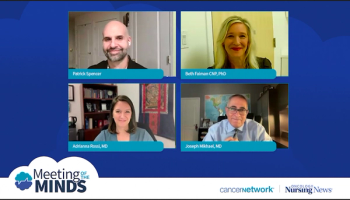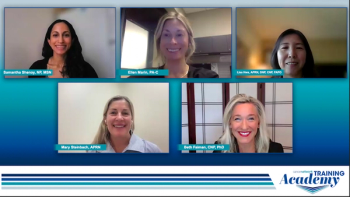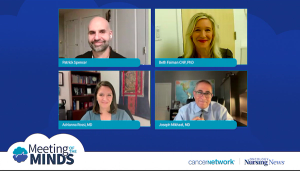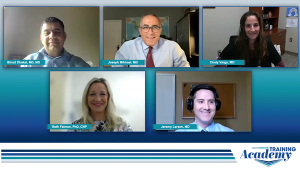
This segment examines Dr. Mikhael's approach to comparing ide-cel and cilta-cel for patient selection, emphasizing how patient traits, efficacy, and safety profiles influence treatment decisions across different groups.

Your AI-Trained Oncology Knowledge Connection!


This segment examines Dr. Mikhael's approach to comparing ide-cel and cilta-cel for patient selection, emphasizing how patient traits, efficacy, and safety profiles influence treatment decisions across different groups.

This segment explores Dr. Rossi's clinical experience with cilta-cel as a second-line therapy, focusing on its efficacy and quality-of-life benefits across diverse patient populations.

This segment examines the evidence supporting cilta-cel in second-line therapy, highlighting key outcomes from the CARTITUDE trials and comparing them to other available second-line treatment options for multiple myeloma.

This segment highlights the treatment journey of a 68-year-old IT professional with high-risk multiple myeloma, detailing progression after initial D-RVd therapy, refusal of ASCT, and successful transition to cilta-cel CAR-T therapy with manageable adverse events.

This segment discusses the process and critical importance of bridging strategies for patients awaiting CAR T-cell therapy.

This segment examines the decision-making process between CAR-T therapy and other innovative treatments, exploring scenarios where alternative therapies may be more appropriate.

This segment highlights clinical experiences with ide-cel in the second-line setting, focusing on observed improvements in efficacy and quality of life, as well as challenges in administration

This segment explores factors influencing patient candidacy for CAR-T therapy, including age, fitness, and relapse specifics, and evaluates key findings from the KarMMa trials to compare ide-cel with other second-line treatment options for multiple myeloma.

This segment explores the treatment journey of a 55-year-old mother and high school teacher with ALK-positive NSCLC and brain metastases, focusing on her experience with lorlatinib therapy.

Following the review of a case of a patient with relapsed/refractory multiple myeloma, the panel provides expert perspectives on adverse event management practices.

Experts on multiple myeloma address the intricacies of adverse event management practices, focusing on taste changes and associated weight loss.

Samantha Shenoy, NP, MSN, presents the case of a patient with multiple myeloma and the panel discusses adverse event management practices.

The panel provides an overview of REMS programs for bispecific therapies in multiple myeloma and discusses how institutions can educate healthcare professionals outside of oncology.

Experts on multiple myeloma discuss prophylactic supportive measures to prevent CRS and ICANS in patients who receive GPRC5D therapy.

Mary Steinbach, APRN, shares her experience in managing dysgeusia and nail- and skin-related toxicities seen in patients with multiple myeloma who receive talquetamab.

Focusing on patients with multiple myeloma who receive GPRC5D-targeted therapy, Beth Faiman, CNP, PhD, discusses how long-term treatment impacts patients’ tolerance to adverse events.

Experts on multiple myeloma offer clinical insights on preparing patients who are going to receive GPRC5D therapy, highlighting step-up and treatment dosing for talquetamab.

Beth Faiman, CNP, PhD, outlines unique toxicities seen with other GPRC5D-targeted therapies in multiple myeloma.

Focusing on the MonumenTAL-1 study, Mary Steinbach, APRN, provides clinical insights on nail, skin, and oral toxicities associated with talquetamab.

Lisa Hwa, APRN, DNP, CNP, FAPO, describes the unique challenges in managing adverse events associated with GPRC5D therapy compared with other bispecifics.

Ellen Marin, PA-C, provides an overview of adverse effects associated with BCMA-directed bispecific therapy in multiple myeloma.

A panel of experts on multiple myeloma discuss long-term follow-up data from the MajesTEC-1 and MagnetisMM-3 clinical trials.

The panel concludes by offering key takeaways on the treatment of patients with relapsed/refractory multiple myeloma who receive CAR T-cell therapy.

Continuing the discussion on supportive care strategies, the panel discusses the management of cytopenias and HLH/MAS following CAR T-cell therapy.

Experts on multiple myeloma provide clinical insights on supportive care strategies for patients experiencing infections or secondary malignancies following CAR T-cell therapy.

Focusing on supportive care practices, the panel discusses the critical role of effective multidisciplinary team collaboration and communication in optimizing the management of CRS and ICANS in patients receiving CAR T-cell therapy.

The panel provides comprehensive insights on the treatment of ICANS following CAR T-cell therapy, highlighting the role of imaging, clinical trial data, and clinical pearls for community practices.

Donna Catamero, ANP-BC, OCN, CCRC, presents the case of a 77-year-old patient who experienced ICANS following CAR T-cell therapy and describes the role of the ICE score.

Experts on multiple myeloma provide clinical insights on strategies to manage or mitigate CRS, highlighting premedications, the role of bridging therapy, and potential treatment strategies.

The panel discusses the mechanisms believed to cause cytokine release syndrome associated with CAR T-cell therapy and the signs and symptoms.

Published: February 7th 2025 | Updated: January 31st 2025

Published: February 7th 2025 | Updated: January 31st 2025

Published: July 3rd 2024 | Updated:

Published: September 27th 2024 | Updated:

Published: June 14th 2023 | Updated:

Published: October 11th 2024 | Updated: